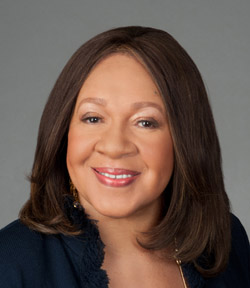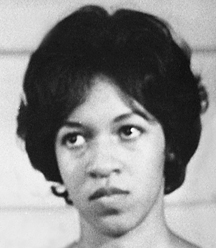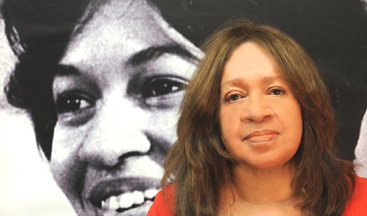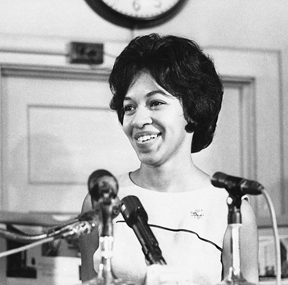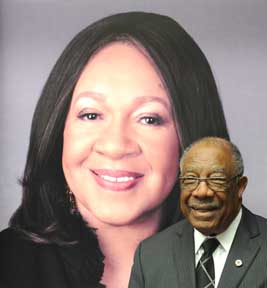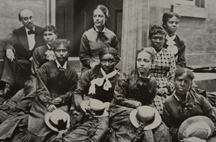

1963-2013: Desegregation—Integration “Henrie was in my English class and taught by a truly great, and demanding professor, Dr. Jack Ashley. Everyone knew who Henrie Monteith was. She was intelligent and quiet. At first, the students were nervous; most had never been in a classroom with a person of color. But after a few weeks, all of us became more concerned about our papers and quizzes and quickly overcame any overt concerns about her being in the class. We were all just trying to survive.” Thorne Compton |
||||||||||||||||||||
|
Henrie Monteith Treadwell attended school in Columbia through the eighth grade and completed her secondary education in Virginia. After first being denied admission to USC in 1962, she enrolled at Notre Dame College in Baltimore, MD. She was graduated from the University of South Carolina with a B.A. in biology and received an M.A. in biology from Boston University and a Ph.D. in biochemistry and molecular biology from Atlanta University. Presently, Dr. Treadwell is Senior Social Scientist and Associate Director of the National Center for Primary Care at the Morehouse School of Medicine in Atlanta, Georgia. Her professional interests focus on community-oriented primary health care and underserved populations. Before joining the National Center for Primary Care, Dr. Treadwell served as program director at the W. K. Kellogg Foundation of Battle Creek, Michigan. |
|||||||||||||||||||
“Because of my family’s activism, I grew up understanding that there was a problem, a race problem and a segregation problem . . . and accepting the fact that my family fought against it. My family, particularly my mother and Aunt Modjeska, instilled in me an understanding that something needed to be done.” The fight to desegregate USC “was a natural decision. In a sense, I was raised for that moment. It was a role I could play in the civil rights struggle. It was my turn.” Henrie Monteith Treadwell, as quoted in “Raised for Activism” by Rebecca L. Miller, 2008, p. 123. |
||||||||||||||||||||
“Many individuals in South Carolina, white and African American, mobilized quickly once I announced my intention to actually enroll to insure that I had ‘friends’ and supporters. The encounter with the well-intentioned often left me with the clear impression of people who wanted to help, but who did not always understand. One young man, in a ‘prepping’ meeting asked me what it was like to ‘look in a mirror and see a black face staring back at me.’ I learned patience, understanding, and forgiveness. I could have been, maybe should have been, hurt or insulted by this ‘educational’ process by which I learned, but I developed a stronger sense of mission, purpose, and commitment to the elimination of divisiveness, misunderstanding, and inequity. And . . . I had a loving and supportive family and an enormous network of ‘drummers’ who had decided that we should shift the paradigm of business as usual in South Carolina and march to a different beat.” Henrie Monteith Treadwell, as quoted in Carolina Voices |
|
|||||||||||||||||||
“Entry into the University, the day of enrollment, was not a major event in my life even though it was a signal event for all of South Carolina. Entry was just one more small step on the path to equality for all citizens of South Carolina. I hardly saw the press, the security people, or those who wished for me to go away, to disappear. There were those whites who meant well, I suppose, who said to me “It’s all right for you to go to the University; you are from a good family. It’s those others that we do not want at the University.’ I always smiled and took guidance from an inner spirit that must have been provided by The Almighty. Who were “those others’? Those ‘others’ included me in so many ways, on so many days. I enrolled for ‘those others.’ And for myself. Wanted or unwanted, I decided that ‘we’ had a right to be at the University of South Carolina.” |
||||||||||||||||||||
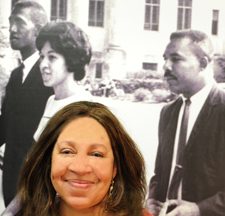 |
“The dynamite sticks thrown in the yard of my uncle and aunt, Henry and Martha Monteith, did nothing to deter us. We saw this assault as yet another truly misdirected and uninformed attempt to stop the move to the future. The hate phone calls, the actually-insulting, but perhaps well-meaning, comments all strengthened my resolve. If we had simply been viewed as people with the same rights that whites took for granted, we might have left them to themselves . . . to their detriment, I think. Currently, I view daily the transition of America from a white to a community of color. The future was drumming at the heels of South Carolina in 1962-63, but only a few of us were listening.” Henrie Monteith Treadwell, as quoted in Carolina Voices |
|||||||||||||||||||
“After enrollment into my classes I saw myself as just a student. Yes, I noticed the security. Yes, I endured harassing phone calls on campus. Yes, I endured little parcels left at my dormitory door. I enjoyed knowing that those who planned the harassment took more time planning to bother me than I spent eliminating the acts of hate, or disrespect, from my mind. No one could invade my privacy or my pride, and I thank my family for imbuing me with the force of will that made it possible for me to laugh and just move on to the next classroom assignment. I knew that many of my professors did not embrace the principles of segregation, of the old confederacy. So the classrooms were safe, if not always extremely nurturing, places.”
“The cafeteria was always a warm place for me even though I ate alone most of the time. The cafeteria help were mainly African American and they looked after me. I continue to believe that where a ‘family’ does not exist, one can be created. The men and women who prepared and served the meals, and who cleared the tables, were my friends and supporters. A part of the African-American ethos in that time meant that we were always there for each other. Today, in many ways we are still there for each other when others choose to be absent. Importantly, at the time, I did not need more, as members of my community were there for me in whatever way that they could be.” |
||||||||||||||||||||
“Am I satisfied with my decision to enter the University? Absolutely!!! So many worked so very hard to prevent the desegregation of the University of South Carolina from following the path witnessed in other southern states. I succeeded in doing my part because so many men and women of all colors worked hard to insure that I could persevere and achieve.” Henrie Monteith Treadwell, as quoted in Carolina Voices, edited by C. B. Matalene and K. C. Reynolds, 2001, pp. 179-181.
|
|
|||||||||||||||||||
|
||||||||||||||||||||
“Leadership is the ability to envision previously unimagined futures and to put in motion a SERIES of actions that may not achieve our vision in our short lifetimes but that will insure that those old days and outdated ways are gone and will NEVER, EVER come again.” |
||||||||||||||||||||
![]()

to next exhibit

an institutional member of the International Coalition of Sites of Conscience
Museumofed@gmail.com

